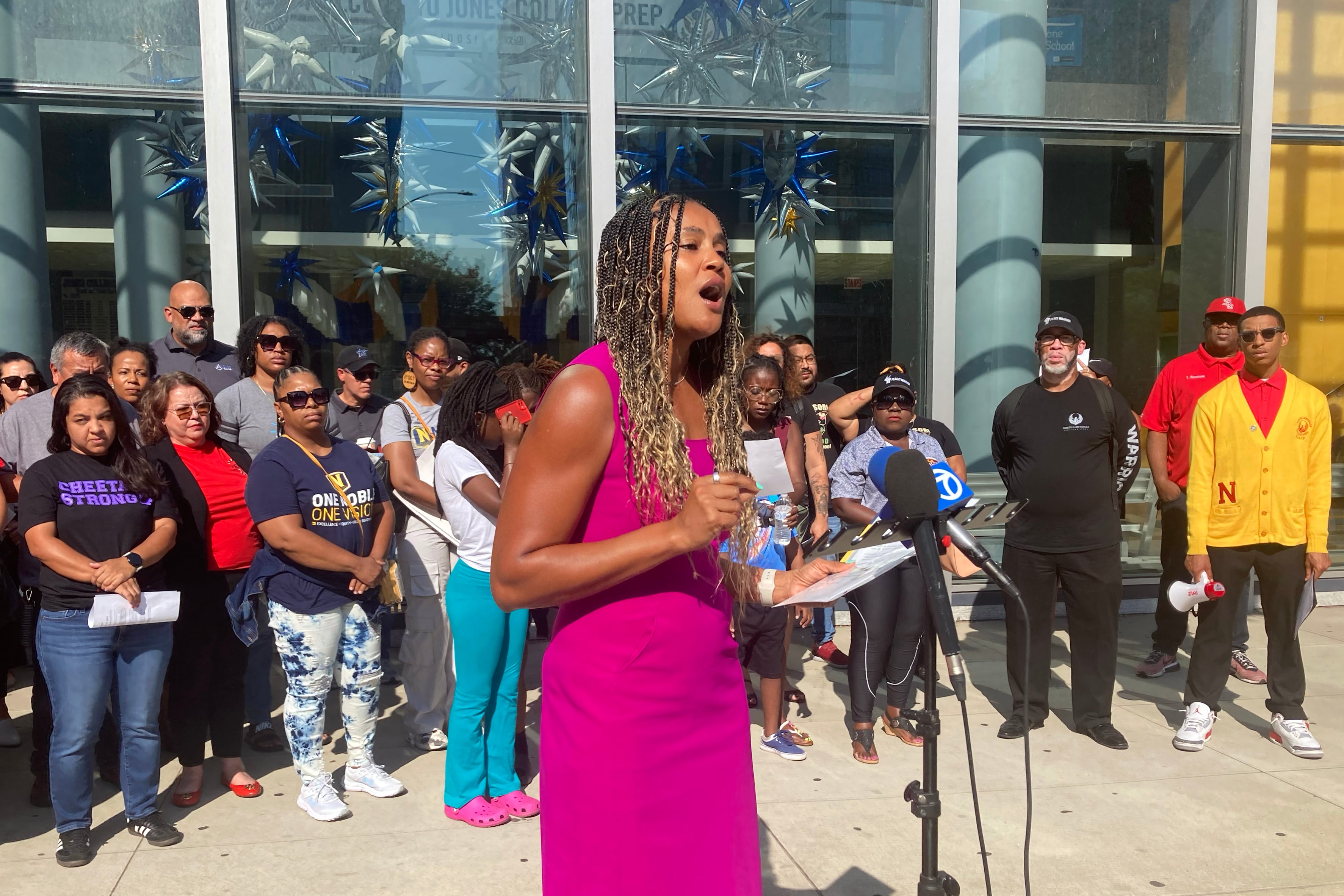Sign up for Chalkbeat Chicago’s free daily newsletter to keep up with the latest education news.
Charter school officials and families rallied Wednesday to press the Chicago Board of Education for more clarity on their campuses’ prospects as the district is poised to shift away from school choice with the upcoming release of a new strategic plan.
About two dozen parents and staffers dressed in T-shirts for the Noble, Acero, and CICS charter networks and other schools joined a protest before the board’s meeting to review the agenda for its Aug. 29 meeting.
Kobey Lofton, a graduate and employee of North Lawndale College Prep, led the group through chants of “Our children, our choice/ Don’t silence our voice,” and “Hey, hey, he, he, charter schools are best for me.” Lofton later told the board that participating in that charter school’s lauded Peace Warrior violence prevention program built his leadership skills, while its scholarship program sent him to National Louis University on a free ride.
The district is gearing up to put out a five-year strategic plan — one its leaders have signaled will aim to revitalize district-run neighborhood schools and rein in a choice system that officials say has undermined those campuses.
In December, the school board backed a resolution spelling out its intent of breaking with choice and privatization. Charter advocates read privatization as code for charter schools, which are public campuses run by private entities. They have demanded reassurance from the district and the board that the plan won’t be an assault on charters.
District officials have stayed mum on details of the plan, which also has caused some anxiety among families at district-run magnet and selective enrollment schools. Officials have said they wanted to first gather community feedback at a series of public meetings and in other settings this past spring.
“This silence is not just an oversight,” said Constance Jones, the CEO of the Noble Schools network. “It’s a deliberate attempt to dismantle school choice in Chicago.”
After roughly a dozen parents and officials addressed the board later Wednesday morning, member Elizabeth Todd-Breland said she appreciated families’ advocacy. She said charter parents were heard during strategic plan community meetings; some had a chance to speak with Alfonso Carmona, the district’s chief portfolio officer and point person on charters, at a meeting Todd-Breland attended in the spring. The district is still putting the finishing touches to the plan before its release, she said.
“Certainly we will let everyone know when that happens as it will be forthcoming,” she said.
After rapid growth in charter campuses during the 2010s, Chicago has largely lost its appetite for charter expansion in recent years and has placed these schools under growing scrutiny. The district has added requirements to its process for renewing charters and opted for much shorter renewals.
District leaders have said this approach is a key course correction, bringing greater accountability for charters and ensuring they are managing their finances well and addressing issues such as excessive student discipline. Charters were created to provide distinctive, academically rigorous options to families, Todd-Breland has said, and if they are not doing that, they shouldn’t exist and siphon students and funding from traditional schools.
Chicago charter schools serve about 55,000 students, or about a fifth of all students in the district. Their student bodies are predominantly Black and Latino and low-income.
Charter advocates have argued that the charter renewal process has become too cumbersome, and detracts time and energy from serving students. Addressing the board on Wednesday, Jones said “excessively short” renewals of almost 50 charter campuses in January sent an unsettling message, “essentially telling parents their schools are temporary.”
Myisha Shields, the parent of a Catalyst Maria charter student, said she credits the school with helping propel her four older daughters to college.
“You all say you support neighborhood schools,” she told the board. “Well, look around you. Charters are neighborhood schools.”
Allison Jack of the advocacy group Illinois Network of Charter Schools, which organized the protest, said the charter community is nervous that there won’t be much time to review and offer input on the strategic plan before the school board votes on it.
She said families are eager to see a plan that clearly spells out the district’s goals, funding, and other support for charters in the next five years. The group and others have demanded written responses to questions about the role of charters in the strategic plan.
“It’s been radio silence since the resolution they put out,” she said.
The district said in a statement that its leaders are listening closely to charter officials and families, and are putting students’ interests first in the charter renewal process.
“The District’s Strategic Plan outlines a commitment to schools — including selective enrollment, magnet, and charter schools — where access to a wide range of high-quality options for families are continually offered,” the district’s statement said.
Mila Koumpilova is Chalkbeat Chicago’s senior reporter covering Chicago Public Schools. Contact Mila at mkoumpilova@chalkbeat.org.






